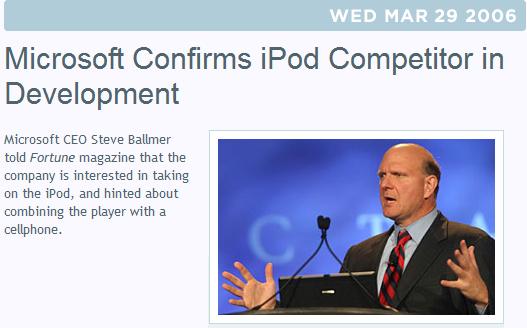iPod Killer ? Only if it has a French accent.
This Friday the BBC carried a story Microsoft has said reports that the company is planning an MP3 player to rival the iPod are based on "speculation and rumours". Indeed, they are. Speculation and rumours aren't always wrong. It made me go back to something I started last Friday after reading a story French lawmakers pass 'iTunes law' from Associated press which was carried in Business week.
Microsoft has also heard a French accent delivering bad news about media players and opening up secrets. The EU action against Microsoft stems from a complaints by the self styled "European Committee for Interoperable systems" - their membership includes only one European company in a rag-tab and bobtail collection of Microsoft opponents. Adobe Systems, Corel, IBM, Linspire, Nokia, Opera, Oracle, RealNetworks, Red Hat, and Sun Microsystems. Call me biased but interoperability isn't a word I associate with IBM or Oracle. But then I thought that the people who made a product decided what went in it and customers chose to buy or not: ECIS's lawyer complained that "Microsoft chooses itself what users will have as product."
Apple are used to being a minority player, and choosing what users will have. The French say Apple's share in the Music player market means they can't be allowed to do that with Digital Rights Management. DRM can't be truly open, the player enforces the license as it decrypts content: open up the code you'd soon have a version which saved the decrypted content. Even so, anyone can license Microsoft DRM technology and make their own player or start a music store. I wrote earlier about, making it easy for other people to use your product in their solution, there we are, doing it again.Conversely downloads for the iPod must come from iTunes (or be available unprotected). And once you have licensed content from iTunes, no other player can decrypt and play it, so customers are locked in to Apple.
According to the AP report, the French law "states that companies are expected to share the required technical data with any rival that wants to offer compatible music players and stores" . If iTunes customers are to switch brands and take the content they've paid for, then Creative, Phillips, Samsung and the 20 other Microsoft's licensees must opt to license Apple DRM.
A compromise for Apple would be a "DRM transcoder" which replaces their protection on files with Microsoft style protection - allowing playback on other peoples' players. They could also license the Microsoft playback technology so iPod owners can play music from other stores. Customers would need to want to change, but the ties would be loosened. This might not satisfy people like the EU or ECIS who seem to think that once people have something they are too stupid and/or lazy to move on to a better alternative. The failure of anyone to take up Windows XP-N (no Media) gives the lie to the idea this. People didn't buy Real Networks product because Microsoft included media player: they didn't buy it because they didn't want it.
AP quoted the French culture Minister saying "Any artist's work that is legally acquired should be playable on any digital device." Very laudable, but no-one has said why this shouldbe true for digital music. It's not true of DVDs thanks to regional encoding, it was physically impossible with VHS and Betamax tapes. And it isn't true of software (unless you invest in virtualization) - Mac owners can't move to a Dell or HP or Toshiba PC without changing their software. The EU has done nothing about the high prices which stem from region locking of DVDs, the market dealt with Betamax and Mac owners understand the software situation before they buy. Apple might conclude that if a product doesn't win much market share it can be as closed and proprietary as you like: but if you win lots of customers your competitors lobby governments to interfere to give them access.
It's interesting to ponder how much technology Apple would license to stores and player makers, and how much Microsoft technology they would license for themselves. Would iTunes sell onto other players ? Could both iTunes and the iPod end up supporting the Microsoft format - meaning the French makes everyone license the same (Microsoft) technology. That would be ironic, especially if we are working on a player.
No information I can find tells me that we are working on a player - but if we are it would be under wraps, so that's no surprise. My gut feel is that if we are, it won't be branded Microsoft. Reports that a player with integrated Wireless networking is being hawked around may be a bit like the reports about Origami - also reported as a Microsoft branded "iPod killer" before it launched. We went as far as making production samples of "Stinger" phones, and I hoped we'd see a Microsoft branded phone, but the strategy of design but don’t implement seems to have worked and I think the same attitude will hold for players.
My wife has a Nano because it is beautiful object, not because it is better at playing music. Anyone who wants to take on Apple needs to start by hiring great design talent and building a product that people want more. Apple also has brand chic, and I doubt that a Microsoft label will combat that – even if we called it the X-Pod. Personally, I don't understand why anyone wants a phone and an MP3 player when they can have a device that does both. Back in 2000 I was using my iPaq as a music player and for the last 4 years I've been using a smartphone to do the same job. Some of the wider ranging reporting (like Gizmodo) suggest that's where Microsoft - at least Steve Ballmer - sees the future. But Steve, It needs to be SMALLER !
